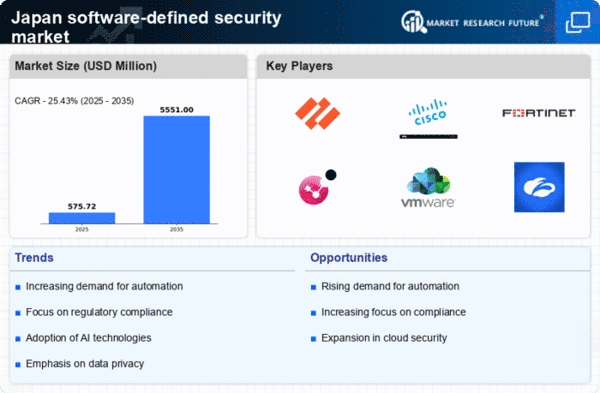Rising Cyber Threat Landscape
The software defined-security market in Japan is experiencing heightened demand due to an increasingly complex cyber threat landscape. Cyberattacks have surged, with reports indicating a 30% increase in incidents over the past year. This escalation compels organizations to adopt advanced security measures, driving growth in the software defined-security market. Companies are seeking solutions that offer real-time threat detection and response capabilities. As businesses transition to digital operations, the need for robust security frameworks becomes paramount. The software defined-security market is thus positioned to expand as organizations prioritize cybersecurity investments to safeguard sensitive data and maintain operational integrity.
Increased Adoption of IoT Devices
The proliferation of Internet of Things (IoT) devices in Japan is significantly influencing the software defined-security market. With an estimated 1.5 billion IoT devices expected to be in use by 2025, the security of these devices is critical. Each connected device represents a potential vulnerability, necessitating comprehensive security solutions. The software defined-security market is adapting to address these challenges by providing tailored security measures for IoT environments. This trend is likely to drive market growth as organizations recognize the importance of securing their IoT ecosystems against potential breaches and attacks.
Shift Towards Remote Work Security
The shift towards remote work arrangements in Japan has created new security challenges, thereby impacting the software defined-security market. As more employees work from home, organizations are compelled to implement security measures that protect remote access to corporate networks. This trend has led to increased investments in software defined-security solutions that facilitate secure remote connections and data protection. The market is expected to grow as businesses seek to ensure that their remote workforces are adequately protected against cyber threats, thereby reinforcing the importance of robust security frameworks in the evolving work environment.
Demand for Enhanced Network Visibility
In Japan, the software defined-security market is witnessing a surge in demand for enhanced network visibility solutions. Organizations are increasingly recognizing that understanding network traffic is essential for effective threat detection and response. As a result, investments in software defined-security solutions that provide comprehensive visibility into network activities are on the rise. This trend is supported by data indicating that companies with advanced visibility capabilities can reduce incident response times by up to 50%. Consequently, the software defined-security market is likely to benefit from this growing emphasis on network transparency and proactive security measures.
Focus on Cost-Effective Security Solutions
In Japan, organizations are increasingly prioritizing cost-effective security solutions, which is shaping the software defined-security market. As businesses face budget constraints, there is a growing demand for security solutions that deliver high value without excessive expenditure. The software defined-security market is responding by offering scalable solutions that can be tailored to meet varying organizational needs. This trend is likely to drive market growth as companies seek to balance security investments with financial considerations, ensuring that they can protect their assets while managing costs effectively.

















